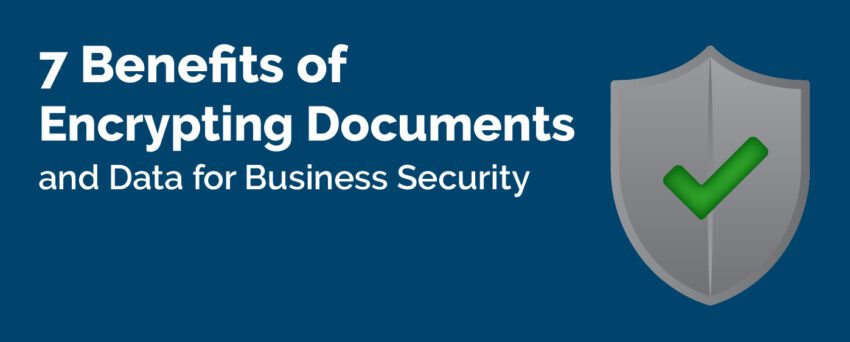02Feb 2023
Data is the lifeblood and fuel of any organization, and hackers know it. They are using new techniques to breach the most secure servers and steal data from companies. Data encryption is one of the most effective ways to protect your data and sensitive documents like financials, strategies, plans, and trade secrets.
According to a report published by IBM, encryption is the second-most effective way to mitigate the risk of data leaks.
In today’s article, we want to share the seven most important benefits of encrypting your files with you to avoid data breaches or legal repercussions.
What is Data Encryption?
As the name suggests, data encryption – also known as ciphertext – is the process of converting data into complex codes and encryptions, making data impossible to understand for humans and machines without proper credentials.
In other words, encrypted data is unreadable and needs a digital key to be decrypted (turned back to a human-readable format). This makes your documents more secure, and even if a hacker manages to steal the encrypted data, the files are useless without the key.
Why Businesses Should Use Encryption: Benefits for Document and Data Security
Limited technical skills, complex encryption tools and integrations, and an overall lack of understanding of how to use encryption effectively have made many businesses shy away from the technology. Yet, the benefits of encryption far outweigh the initial setup difficulty.
Here are seven benefits that’ll make you understand why your business should start implementing encryption on all your company’s files – plus, we’ll share with you a little secret to implement encryption in just a few minutes without any technical knowledge:
1. Encryption Protects You Against Regulatory Fines

Encryption is mandatory for most organizations. Some regulatory acts make encryption compulsory for various governing bodies:
- HIPPA Act of 1996 – applies to US healthcare organizations handling sensitive patient information
- GDPR – applies to EU organizations storing and using the personal information of EU citizens to sell them goods or services
- European Banking Authority – applies to EU banks and third-party merchants trusted with the financial information of EU citizens
- Payment Card Industry Data Security Standard – applies to all global organizations that deal with credit card information
Other than these 4, many other regulatory acts force organizations to take the confidential data of citizens seriously. While some acts explicitly require data encryption, others focus more on general security and data protection.
MSSB has been fined 35 million by the SEC for failing to encrypt the HDDs (hard drives) that store the personal identifying information of their consumers. Another encryption-related fine of $4.3 million was filed against MD Anderson Cancer Center under the HIPAA act due to a stolen laptop with 30,000 patient files.
2. Encryption makes remote working safer
Remote work has been picking up recently, and this trend is likely here to stay. Now employees prefer to work remotely, and most companies at least have a hybrid working policy. However, it has been found that the chances of data leaks are higher when employees work from home.

In most cases, files are stored on third-party servers like Dropbox, Google Drive, and OneDrive. Although there’s nothing essentially wrong with these platforms, your files are at the mercy of hackers.
Your entire documentation could be at risk if your employees manage sensitive data and get their credentials stolen or phished.
When you encrypt your files, no one can access them, as only you have the decryption files.
Sharing files is also an essential part of remote work, and, mostly in office space, they are transferred via an intranet, limiting the chances of getting hacked. When working remotely, employees share files using their private internet connection or public Wi-Fi. To protect sensitive files, they should be encrypted, and it is also a good idea to use VPNs to stay more protected from cyberattacks.
3. Encryption Boosts data integrity

Data is everchanging, and it is very hard to ensure the integrity of data. Encryption can be used to verify that the data stored in your servers is accurate and consistent. In the case of file sharing, encryption plays an important role by ensuring that during transit, hackers can’t alter the existing data. Even if the encrypted data is somehow tampered with, the receiver would know that by running a simple check.
Data alteration is something that is often overlooked by companies, but companies are also a vital part of keeping the data safe. The alteration of data makes the data useless, which is the reason why many companies have failed to achieve their desired targets. Untampered authentic data can give companies valuable insight into what their customers want from them.
Data encryption is a step in the right direction to increase the integrity of your data and ensure it is not tampered with. Encrypting data ensures that only people who are authorized can access a company’s valuable confidential data.
4. Encryption Helps You Gain Customers’ Trust
With rising reports of online scams and credit card fraud, people are now serious about protecting their private information. Companies realize this, and even though they are not required by law to encrypt their data, they do it to gain the trust of their customers.

Even people who are not that tech-savvy know not to trust websites that don’t use HTTPS protocols. Seeing the lock sign on your website boosts a customer’s trust in your brand and shows them you take their privacy seriously.
The same happens with your information. Your customers can feel more secure in sharing vital details if they know you’re handling their data securely.
5. Encryption Protects Your Employees’ and Customers’ Privacy

Employees’ and customers’ personal information has to be stored in servers to run a company business effectively. It is essential to protect their data and ensure that the privacy of the people who trusted you with it is secured.
It is a good idea to encourage your employees to use encryption even when storing data on their personal devices. They can keep their sensitive data, like tax records, photos, and identification documents safe with encryption. If a hacker gets access to them, they can use these details to blackmail the employee or hack into the company network.
On the same note, all customer data should be encrypted to avoid leaks, misuse, or corruption. Plus, you can provide the key to those files to only those that need to use the information in their work, protecting it from unauthorized team members and third parties.
6. Encryption gives you an unfair advantage over your competition
Encryption is an added layer of security for your data that is inexpensive yet highly effective, making it easier for the cybersecurity expert in your company to do their job, and giving management peace of mind.

Customers trust brands that take their privacy online seriously, and using encryption to protect their information is a great way to demonstrate this.
For companies like accounting firms that deal with tax records and other critical data, a document management system is unavoidable to keep data easy to organize and use. Adding a layer of encryption gives you more control over who gets to see what is on your management system, providing a better experience to end users.
7. Encryption Is Cheaper and More Flexible Than Ever

With modern encryption software, using only one tool to keep data safe on all your devices is straightforward. The settings are a bit different on each device, but it is not required to buy additional software now to keep your files encrypted.
Thanks to its popularity and the development of its efficiency, the cost of paid encryption software is decreasing. Companies usually choose to fully secure the HDD of their servers by enabling full or partial encryption.
Wrapping Up: Full Encryption in a Few Minutes
Encryption can be enabled on company servers and data centers, but it requires a heavy investment in hardware and software, which can become an issue without proper planning and management.
In addition, data is the most vulnerable when it is being transmitted, meaning that transferring information from one point to another will multiply security risks.
For that reason, DOCUdavit management services come with features like:
These features can be used by HR departments, lawyers, EMRs, doctors, and businesses of every size to store and access their documents from a centralized location.
To add an extra layer of security, we use an encrypted FTP port to ensure the security and privacy of your records – in other words, all file transmissions are encrypted so unauthorized 3rd-parties can’t intercept your record in transit.
Start using the full power of encryption in just a few minutes with DOCUdavit!

